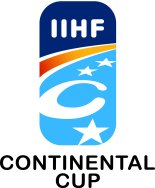DONETSK – Slovak coach Julius Supler is managing one of the most international teams in the world of hockey. Donbass Donetsk unites players from ten different countries. Today the Ukrainians aim for the IIHF Continental Cup win.
The Ukrainian champion plays in the Russian-based Kontinental Hockey League since this season and to be competitive on the next level the club needed to acquire new players.
Because the pool of KHL-calibre Ukrainian players is limited, only four Ukrainian players are on the roster for the Continental Cup after the departure of NHL players Ruslan Fedotenko, Olexi Ponikarovsky and Anton Babchuk. The first two also represented the Ukrainian national team in the Olympic Pre-Qualification in November while Babchuk was born in Ukraine but grew up in Russia and has represented Russia internationally.
In total, nine Ukrainian players have played at least one game on the KHL team this season but a majority of the players comes from elsewhere.
“We have ten nationalities. That’s pretty hard,” says Julius Supler. “I have to make quick decisions and everybody has to understand. It’s a pretty interesting job. You have to be alert all the time.”
Supler was named Donbass coach prior to the 2012-13 season. He has been working in and around Russia since 2003 when he signed with Lokomotiv Yaroslavl. Jobs followed with Riga 2000, Dinamo Riga and CSKA Moscow with a two-year stint as Slovak national team coach in between.
Supler was also the first national team coach in Slovak hockey history when he led the national team at the 1994 Olympic Winter Games and the 1994 IIHF World Championship C-Pool after the country’s independence.
With players coming from Belarus, Canada, the Czech Republic, Finland, Latvia, Russia, Slovakia, Sweden, Ukraine and the U.S., the 62-year-old needs some polyglot skills.
Having worked in Russia before helped, as did his stint with the WHL’s Portland Winterhawks in the ‘90s.
“I even wanted to learn a bit Latvian but it was too hard and I got along in Russian and English,” he says about his five years in Riga.
How does the coach communicate with players from so many different countries?
“I start in Russian and translate everything to English,” he says and adds with a smile: “If somebody doesn’t understand, I will say some harsh words in Slovak, after that everybody understands.”
“It’s an interesting job. Hockey is like a hobby for me so I can be happy to work in hockey.”
One of Supler’s top import players is American defenceman Clay Wilson, who played some NHL games for Columbus, Atlanta, Florida and Calgary before transferring to Donetsk last summer. It’s his first European hockey experience apart from representing the U.S. at the 2011 IIHF World Championship in Slovakia.
“It’s definitely the first time I play on such an international team. It’s a great experience to learn different cultures and the way people work. It’s been a lot of fun this season,” the 29-year-old Minnesota native says. “I really enjoy myself in Donetsk. I’ve been really happy with the city and the people. I have nothing but great things to say about Donetsk.”
Thinking about next season, he even wants to learn some Russian to be able to speak more.
“English is kind of the common language on our team and I’m lucky that most of my teammates speak English,” Wilson says. “That makes it an easy transition for me coming over.”
Today, Donbass Donetsk aims for the Continental Cup win. The math is simple for the team: Donbass Donetsk needs one more point against the Rouen Dragons, meaning a victory – or a loss in regulation time. If the Ukrainians lose the game after 60 minutes, either Rouen or Metallurg Zhlobin will be hoisting the winners’ plate.
“All we think about is a win and coming out to play our best hockey,” Wilson says. “This tournament means a lot for us and we really want to play our best game of the tournament.”
MARTIN MERK
|







